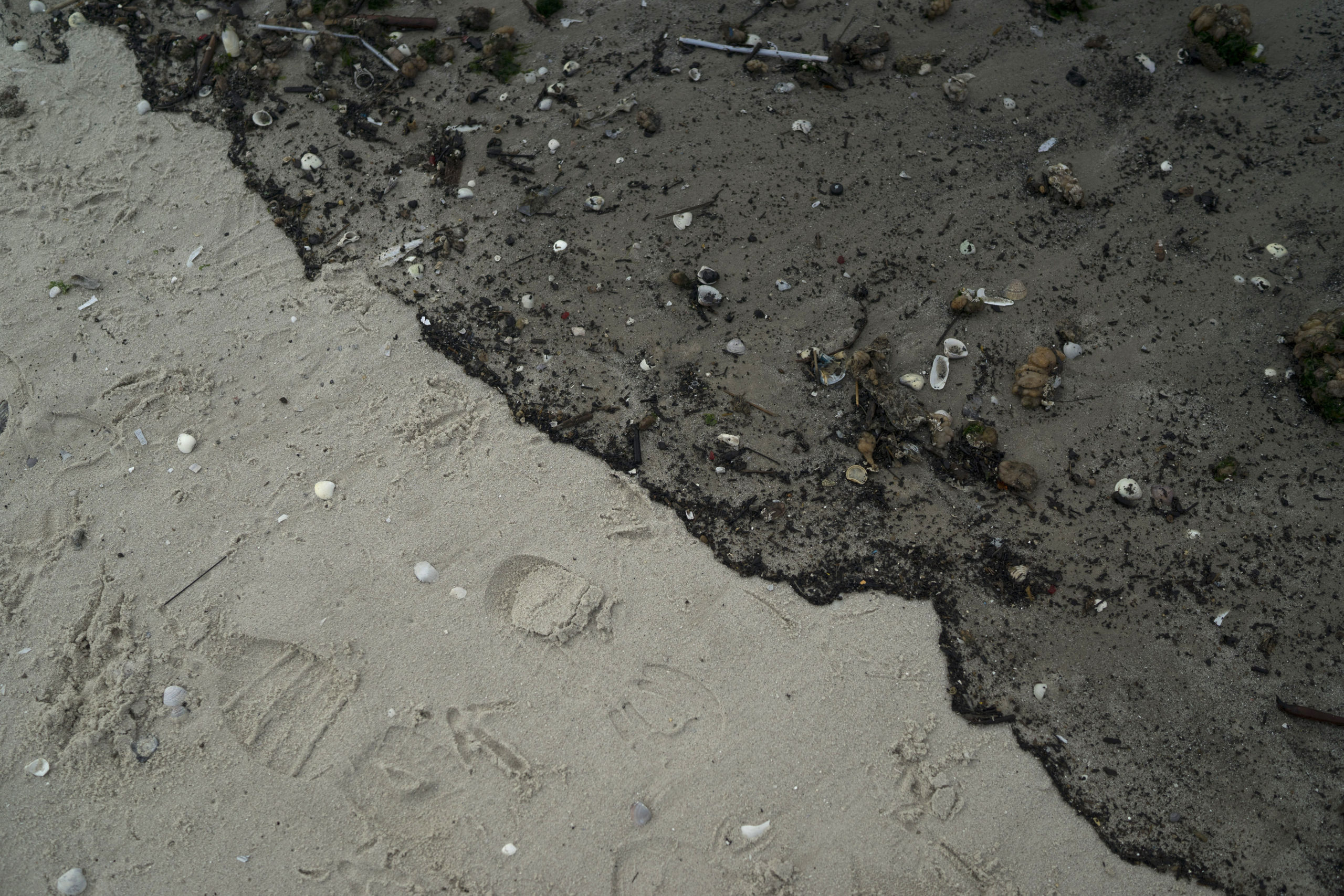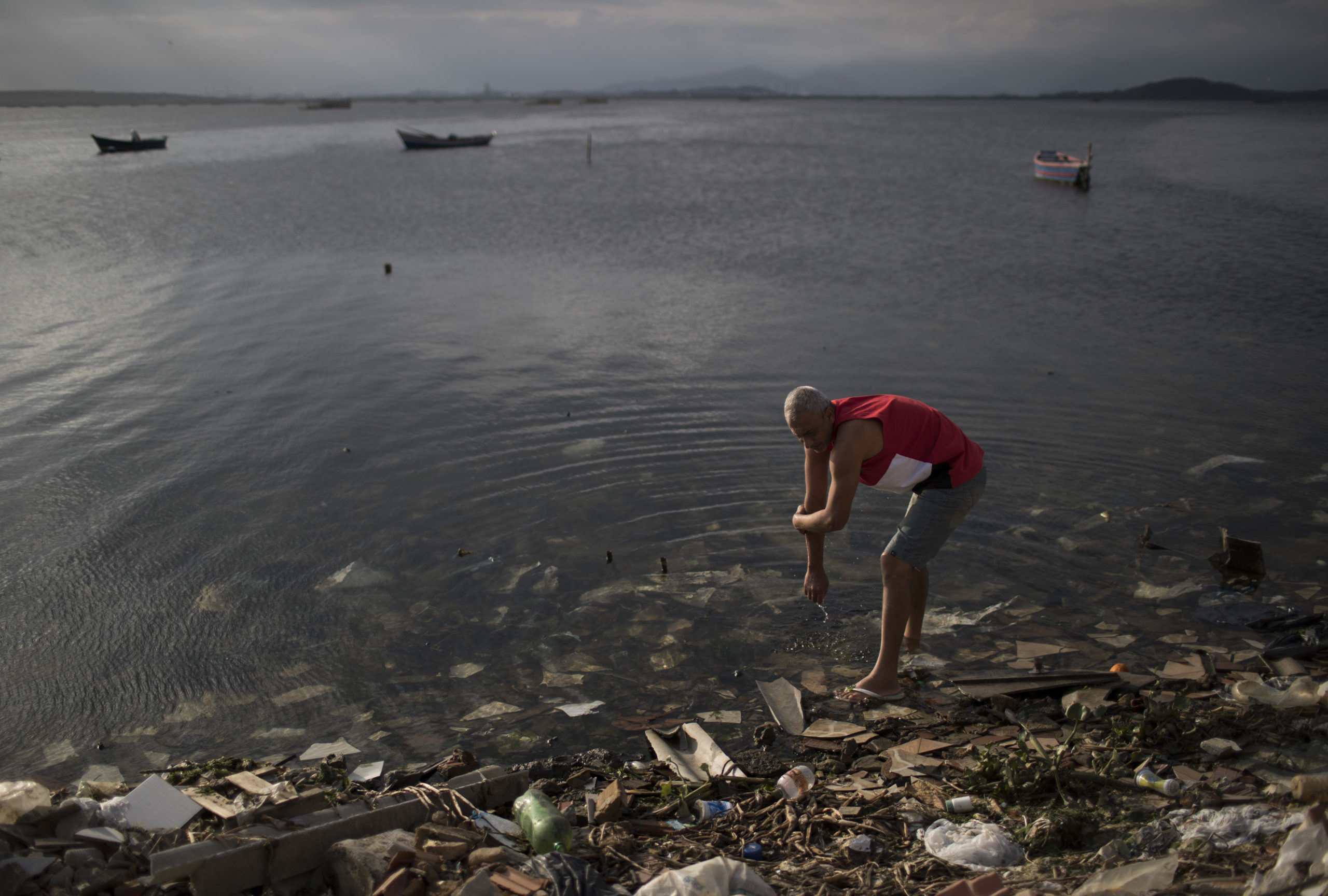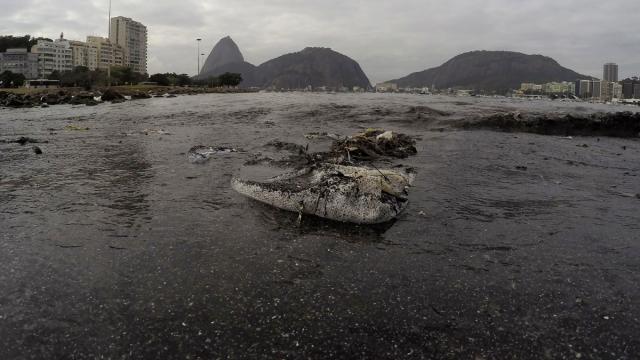Rio’s water is vile — full of raw sewage and dead bodies — and later this week, humanity’s top athletes will plunge into this hellish stew for a jolly ol’ international sporting competition.
Garbage floating near Guanabara Bay, where athletes will compete during the 2016 Summer Olympics. Image: Leo Correa/AP
At this point, it’s too late for Brazil to properly clean up Rio’s befouled waterways for the 2016 Summer Olympic Games. Leaving spectators and athletes alike with one gut-wrenching question: How much of a literal shit-show is this Olympics going to be?
I posed a sanitised version of that question to doctors and epidemiologists familiar with Rio’s water. The general consensus was bleak. Many people will be exposed to waterborne illnesses, and some will get violently ill. However, athletes whose sports take place in the water can reduce their personal risk with a few basic precautions.
For the past year, media reports have painted a ghastly picture of the state of Rio’s waterways, which are blackened by the ceaseless flow of human waste from densely populated neighbourhoods that lack modern sewage treatment. Evan as Olympic officials insist they’d “never risk the health of athletes” for a competition, a 16-month-long investigation by the Associated Press has revealed otherwise: Rio’s water is infested with disease-causing organisms, pretty much all the time.

A little slice of “paradise” on Botafogo beach, near Guanabara Bay. Image: Leo Correa/AP
“From a microbiological point of view, this water is comparable to raw sewage,” said Fernando Spilki, the virologist at Feevale University in southern Brazil who conducted the AP’s water tests.
Among Spilki’s more disturbing findings are that the water is loaded with rotavirus, which is associated with vomiting, diarrhoea and all-around misery. The analysis also revealed disturbing spikes in the levels of faecal coliform bacteria; a marker for diseases like cholera, dysentery, hepatitis A and typhoid, to name but a few. An epidemiologist who preferred to speak off record noted that similar levels of faecal coliform would cause US beaches to be shut down.
Then there’s the recent work of Renata Picao, a microbiologist at Rio’s federal university, who found dangerous, multi drug-resistant bacteria at five Rio beaches, including the one where swimming competitions will take place. As Picao told Gizmodo, she expected these bugs to be rare and was surprised to recover them “extremely easily” from coastal waters.
Clearly, the safest course of action is to avoid Rio’s fetid ocean slop entirely, but that’s not an option for many of this summer’s Olympic athletes. So, how many of them are going to get sick at the Olympics? And can anything be done to reduce personal risk?
The first thing to know is that any contact with the water virtually guarantees infection, according to Kristina Mena, a waterborne pathogen expert who conducted a risk analysis based on Spilki’s data. “Levels of these organisms are so high, that every athlete interacting with the water will be exposed,” Mena told Gizmodo. “Even with small amounts of [water exposure] the risk of infection is 99.999 per cent.”

A man washing himself in polluted water at Guanabara Bay. Image: Image: Felipe Dana/AP
But just because a person becomes infected doesn’t mean they will manifest critical symptoms. That depends on a host of factors, including the person’s overall health, past exposure history and immediate exposure level.
Children, the elderly and immunocompromised individuals are going to be at greater risk than young to middle-aged adults, especially when it comes to multi drug-resistant bugs. For healthy adults including Olympic athletes, innate immunity will depend on past exposure to Rio’s disease-causing pathogens. It’s possible that people who grew up in places with poor sanitation will fare slightly better than athletes who’ve enjoyed clean water their entire lives, but it’s hard to make blanket statements because viruses mutate quickly and are site-specific.
Moreover, when you’re swimming in what amounts to an open sewer, the most robust immune system can’t protect you from everything. “Reducing risk means minimising exposure,” Mena said.
That means trying your best not to swallow water, wearing tight goggles (or just keeping your head from going under) and showering frequently. It means not rubbing your eyes, using hand sanitiser liberally and making sure that any scrapes are immediately cleaned and covered. For some athletes, it even means bleaching oar handles and boats or wearing plastic suits and gloves.
Most of all, minimising exposure means avoiding contact with the water to the highest degree possible.
Neil Fishman, a professor of infectious disease at Penn Medicine, added an additional note of caution about prophylactic antibiotics. “I think taking antibiotics [preventatively] can cause more harm than good,” he said, noting that whether or not an antibiotic will work depends on the type of pathogens a person is exposed to (and antibiotics won’t work against viruses at all). Meanwhile, antibiotics can wreak all sorts of havoc on the body’s native microbiome, leaving a person more susceptible to opportunistic infections like C. difficile.
“I think the only option is rapid treatment post-infection,” he said.
Picao added that if a cut develops signs of infection, the patient should immediately warn his or her physician of potential exposure to multi drug-resistant bacteria.
So, let’s recap. If you’re headed to Rio this month, either to compete or enjoy the apocalypse as a spectator, bear in mind any contact with the water almost guarantees exposure to something that can cause diarrhoea or worse. If you can’t avoid contact, limit it, shower frequently and go to the doctor as soon as you’re home. With a little luck, you’ll emerge from the experience of swimming in a toilet with nerves of steel, a souped-up immune system and a deep appreciation for the wonders of modern sanitation.
